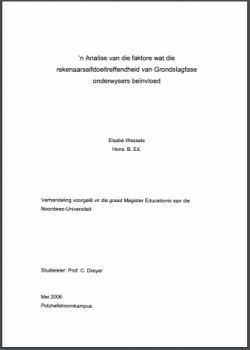'n Analise van die faktore wat die rekenaarselfdoeltreffendheid van Grondslagfase onderwysers beïnvloed

Type
Thesis
Authors
Category
ECCE, Foundation
[ Browse Items ]
Publication Year
2006
Publisher
North West University, Potchefstroom, South Africa
URL
[ private ]
Pages
82 p.
Subject
Early childhood education, Primary education, Foundation Phase, Information and Communication Technology, ICT, Self-efficacy, Teachers, Computers, Age, Social cognitive theory, School support, South Africa
Tags
Abstract
In many countries the introduction of Information and Communication Technology (ICT), especially computers, into schools has been praised as the necessary (although not without problems) course of action for the qualitative improvement of teaching and learning methodology. However, one of the greatest barriers inhibiting the successful adoption of a range of strategies to improve learning in a new technologically enriched framework is resistance from teachers who may feel threatened and disempowered by the change brought about by the introduction of technology into their classrooms. The purpose of the study was to investigate the factors that influence the self-efficacy of teachers in the foundation phase: Which factors influence the computer self-efficacy of foundation phase teachers? What is the relation between the identified factors and the computer self-efficacy of teachers? 0 What are the implications of the results for future training of foundation phase teachers? All teachers (N=34) in the foundation phase in the central region of Lichtenburg, a town in the Northwest Province of South Africa, participated in the study. They completed a questionnaire, which consisted of two sections: The first section determined the teachers' computer self-efficacy. a The second section identified the possible factors that may influence the computer self-efficacy of foundation phase teachers. To ensure that all possible data, with regard to factors that might affect teachers' computer self-efficacy, were collected, the researcher also made use of interviews and observations. The data were analysed by using frequency distributions, Pearson product-moment correlations as well as Analysis of Variance, (ANOVA). The results regarding age and computer efficacy were analysed using ANOVA. The results showed a slight difference in the computer efficacy of the teachers from different age groups. Therefore, it may be possible to enhance the computer efficacy of teachers from any age group. The results indicated a relationship between the computer self-efficacy of foundation phase teachers and some of the identified factors, namely formal training, computer experience and school support. The relation was statistically as well as practically significant. Age and access to a computer did not seem to have a statistically significant effect on computer self-efficacy. The results of this study have implications for teacher training. Computer training will be to the benefit of Foundation phase teachers. Explicit guidance on the choice and use of software and the integration thereof with teaching methods is essential because computer technology is an integrated part of the 21st-century generation of learners.
Number of Copies
1
| Library | Accession No | Call No | Copy No | Edition | Location | Availability |
|---|---|---|---|---|---|---|
| 1 | Potchefstroom, North West Province, South Africa | Yes |

